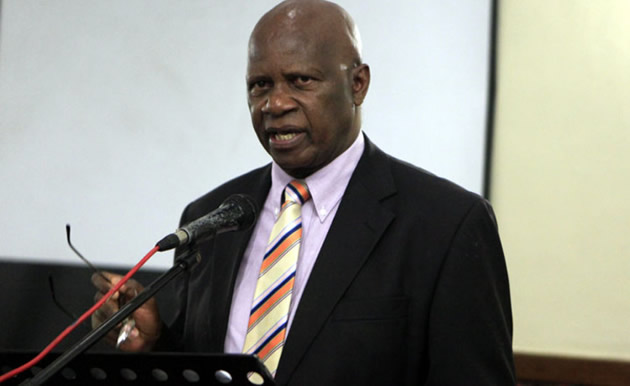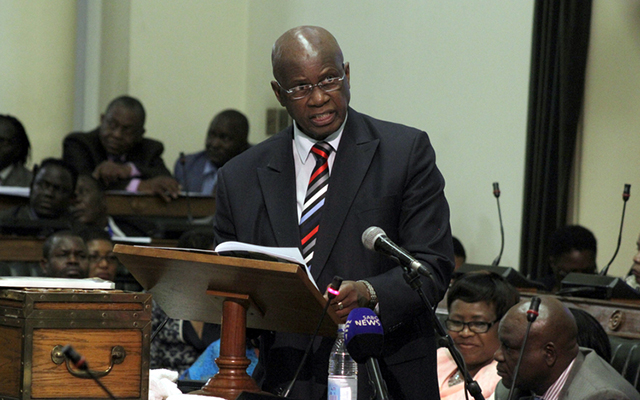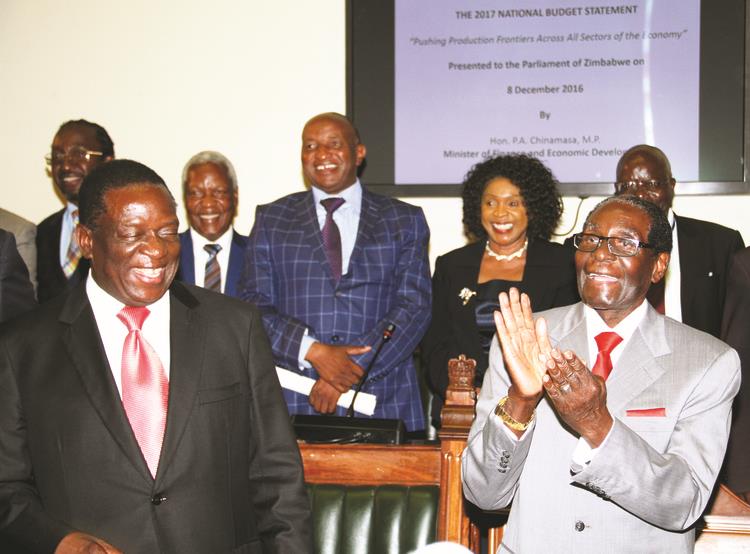Allocations along Zim-Asset lines hailed


Finance and Economic Development Minister Patrick Chinamasa tables his 2017 National Budget proposals before Parliament yesterday
Conrad Mwanawashe Business Reporter—
THE allocation of budgetary resources along Zim-Asset clusters is bound to stimulate production, ensure food security and turnaround the economy, analysts said yesterday. Economic analysts said this would bring the aspect of results-based management in the administration of economic resources. The new thrust is contained in 2017 National Budget proposals presented before Parliament by Finance and Economic Development Minister Patrick Chinamasa yesterday.
The Budget also contains a cocktail of other measures that include supporting the re-engagement process, promoting value chains and business linkages and funding the food and nutrition cluster.
Furthermore, economists hailed Government’s approach towards infrastructure development and incentives for Special Economic Zones, saying this was critical to ensure economic growth. Economist Dr Gift Mugano lauded the minister’s approach saying it was in line with results-based management, upon which Zim-Asset is premised.
“I liked the aspect of allocating funds along Zim-Asset clusters because Zim-Asset, which is based on the result-based management and part of RBM is to realign your outputs with resources. In the previous years it was not very clear how the budget was funding those clusters around ZimAsset,” said Dr Mugano.
“The Minister spoke about unplanned expenditures, which were coming from drought induced El Nino like importing grain. And the total budget, which was not planned for (about $600 million) with the lion share going to importation of grain, so the allocation of about $200 million towards food and nutrition cluster is very key. Because you are trying to avoid importing the same grain next year and that is a plus which is supporting production,” he said.
Immediate past chairman of the Zimbabwe Investment Authority Dr Nigel Chanakira, said fiscal space was always going to be narrow because the country faces massive challenges.
But despite the shrinking space, Dr Chanakira said Minister Chinamasa attempted to push the public sector investment programme by incorporating the private sector and also facilitating greater production by the private sector.
For instance, the concessions on delaying tax on platinum are a clear example where tax reliefs are extended to the private sector if it cooperates with Government in programmes such as value addition and beneficiation.
HIGHLIGHTS . . .
- Growth projected at 1.7 percent, from 0.6 percent estimated in 2016.
- Agriculture and mining to drive overall growth with sector growth of 12 percent and 0.9 percent respectively in 2017.
- Inflation projected at 1.1 percent, from a negative 1.5 percent in 2016.
- Total revenues are projected at $3.7 billion.
- Total expenditures are projected at $4.1 billion.
- Financing gap of $400 million.
- Government wage bill takes $3.0 billion in 2017.
- Capital expenditure amounts $520 million, which is 3.6 percent of GDP;
- Trade deficit of $1.537 billion, compared to $1.985 billion in 2016.
- Debt stock at $11.2 billion as at 31 October 2016, which is 79 percent of GDP.
Dr Chanakira also saw the allocation of $7 million to helping the Infrastructure Development Bank to align itself with the public sector investment programme as another positive development.
“I would imagine that the private sector should actually now seize on efforts of that nature to try and stimulate economic production within the economy.
“Our infrastructure is in serious need of contribution in terms of private sector play and I think with such efforts in conjunction with the Special Economic Zones tax relief can aid the efforts in terms of boosting production, employment and infrastructure development,” said Dr Chanakira.
He, however, felt that Zimbabwe was running behind schedule in the re-engagement process and debt clearance with multilateral and bilateral institutions.
“The 1,7 percent GDP projection for 2017 shows that it’s not too optimistic a figure and I would think that the critical thing now is to get the arrears settled for the African Development Bank programme together with the World Bank. I actually had expected that that programme would have kicked in 2016. So we are actually running in a sense behind schedule on that deep debt rescheduling programme.
“I think given our savings ratio which are very low and of course the skittish behaviour of depositors at the moment we need a complimentary effort by the international capital markets if we could access them by making sure that that programme is brought back on track so that we can inject more liquidity into the domestic market and economy,” he said.
Empowerment activist Dr Davison Gomo, passed the budget as a big step in trying to deal with very complex issues facing the economy and said Minister Chinamasa was never going to come up with a magic wand at all because of the difficulties on the ground.
“But to the extent that he has tried to identify possible arrears, first to raise revenue, second to deal with questions particularly in relation to corruption and bad governance, I would imagine that the sum total of that could obviously see us moving forward in terms of confidence building which he raised,” said Dr Gomo.
“At the moment the reality is that Government has one perception of itself but the public has another and as long as there is no consensus in terms of those realities I think Government will be pulling in one direction and society another. There is need to bridge that.
“The only way that can happen is if your economy starts working, if corruption starts to be dealt with seriously and of course if policy consistency is better managed and far better delivery of Government programmes, unless that happens, a big problem,” he said.
Dr Gomo said focussing on infrastructure development could be a step in the right direction.
“Another area that might just be very important is emphasis on infrastructure development that is critical because just right now unless those issues are addressed the economy will not take off at the pace we want it to do and that will mean next year we are back to talk about the same thing again. And that’s not very helpful,” he said.









Comments